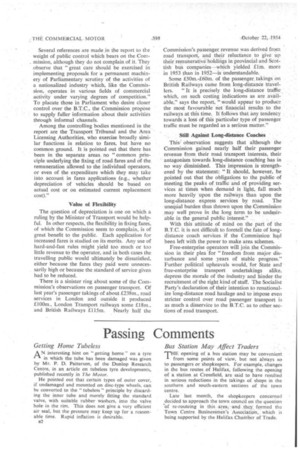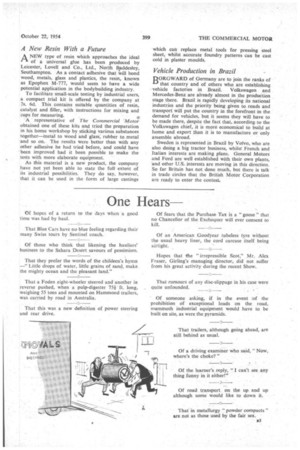Passing Comments
Page 36

Page 37

If you've noticed an error in this article please click here to report it so we can fix it.
Getting Home Tubeless
AN interesting hint on "getting home" on a tyre in which the tube has been damaged was given by Mr. P. D. Patterson, of the Dunlop Research Centre, in an article on tubeless tyre developments, published recently in The Motor.
He pointed out that certain types of outer cover, if undamaged and mounted on disc-type wheels, can be converted to the " tubeless " principle by discarding the inner tube and merely fitting the standard valve, with suitable rubber washers, into the valve hole in the rim. This does not give a very efficient air seal, but the pressure may keep up for a reasonable time. Rapid inflation is desirable.
Bus Station May Affect Traders
THE opening of a bus station may be convenient from some points of view, but not always so to passengers or shopkeepers. For example, changes in the bus routes of Halifax, following the opening of a. station at Crossfield, are said to have resulted in serious reductions in the takings of shops in the southern and south-eastern sections of the town centre.
Late last month, the -shopkeepers concerned decided to approach the town council on the question re-routeing in this area,. -and they formed the Town Centre Businessrnen's Association, which is being supported by the Halifax Chamber of Trade.
A New Resin With a Future
A NEW type of resin which approaches the ideal
of a universal glue has been produced by Leicester, Lovell and Co., Ltd., North Baddesley, Southampton. As a contact adhesive that will bond wood, metals, glass and plastics, the resin, known as Epophen M-777, would seem to have a wide potential application in the bodybuilding industry.
To facilitate small-scale testing by industrial users, a compact trial kit is offered by the company at 7s. 6d. This contains suitable quantities of resin, catalyst and filler, with instructions for mixing and cups for measuring.
A representative of The Commercial 'Motor obtained one of these kits and tried the preparation in his home workshop by sticking various substances together—metal to wood and glass; rubber to .metal 'and so on. The results were better than with any other adhesive he had tried before, and could have been improved had it been possible to make the tests with more elaborate equipment.
As this material is a new product, the company have not yet been able to state the full' extent of its industrial possibilities. They do say, however, that it can be used in the form of large castings which can replace metal tools for pressing steel sheet, whilst accurate foundry patterns can be cast cold in plaster moulds.
Vehicle Production in Brazil
BORGWARD of Germany are to join the ranks of that country and of others who arc establishing vehicle factories in Brazil. Volkswagen and Mercedes-Benz are already almost in the production stage there. Brazil is rapidly developing its national industries and the priority being given to roads and transport will put the country in the forefront in the demand for vehicles, but it seems they will have to be made there, despite the fact that, according to the Volkswagen chief, it is more economical to build at home and export than it is to manufacture or only assemble abroad.
Sweden is represented in Brazil by Volvo, who are also doing a big tractor business, whilst French and Italian interests are making plans. General Motors and Ford are well established with their own plants, and other U.S. interests are moving in this direction. So far Britain has not done much, but there is talk in trade circles that the British Motor Corporation are ready to enter the contest.




































































































